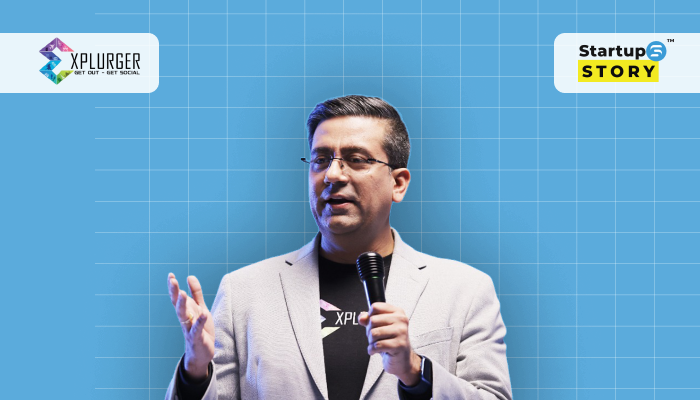This Startup, Medius AI Is An AI-Powered Debt Collection Solution For Banks
- BySheetal Sidhu | August 28, 2021

The CEO and Co-founder of Medius AI, Nitin Purswani covered all his experiences which he experienced on his journey of building up his venture with Startup Story, he told us that he had spent a significant amount of time developing e-commerce & fintech products and “ loves building products from 0-1 & then scaling them from 1-10”. His roots run deep in the world of technology and he began his entrepreneurial journey nearly a decade ago with Zepo, a SaaS e-commerce platform used by millions of consumers and thousands of businesses.
For the last couple of years, he has been fascinated by financial technology, particularly the use of artificial intelligence and machine learning in conjunction with traditional banking systems, which inspired him to found Medius, an AI-powered debt collection solution for banks.
The Problem Statement
Describing the problem statement being addressed by Medius AI, Nitin told Startup story that “The banking sector is booming as the Indian economy expands rapidly. Credit is expanding rapidly too, but so is delinquency”. And under current circumstances when we are battling against Covid 19 has also had a significant impact on the lending industry. Banks and other financial institutions have been issuing warnings of rising NPA. A significant portion of their losses is due to this bad debt, which costs each major bank billions of dollars. Collection and recovery are also some of the most expensive aspects of loan servicing.
The banks are challenged. “Everyone knows that and can read about it daily” he added explaining the situation explicitly. Their NPA ratios are expected to rise four to six times and they are aware of the serious strain on their balance sheet but are unsure how to address it. This is exactly the challenge they have taken on – resolving India’s NPA crisis!
How Medius AI Addressed The Problem
When asked about how Nitin addressed this problem his enthusiastic reply was, “Data-driven debt management can turn this crisis into an opportunity.” Smart debt collection and recovery is critical now more than ever, and technology can help lenders retain revenue and customers. For decades, collection management has been rigid and out-of-date he told Startup Story. COVID-19 brought that to light. Historically, the banking industry has been slow to innovate. Most banks were unprepared for the spike in delinquencies. New laws, mobility restrictions, smaller teams, and dispersed operations have made it even more difficult to manage.
Lenders typically rely on third parties to collect. However, if banks are enabled with new-age technology that helps them reach out to delinquent customers at the right time, with the right strategy, the repayment rates would improve. Strategies for collection management that rely on a single channel, or even multiple channels asynchronously, are prone to failure and so he concluded, “It’s past time for banks to go Omni channel.”
Products And Solutions Offered By Medius AI
Giving a single statement Nitin said, “We use the P-A-R model (Predict-Act-Reduce) to help banks reduce NPAs.” First and foremost, they predict by combining historical bank data with newly generated borrower information. This gives them the Medius Score, which determines whether a delinquent account will self-cure with little to no activity, roll deeper into delinquency (no matter what we do), or make a payment if properly treated.
Second, they use machine learning to train their conversational AI to collect debt quickly. Their collection and recovery models use deep analytics to realign strategy for better results at every stage of the collection – early, late, and recovery.
Thirdly, they use legally integrated workflows to resolve past due accounts. Pre-litigation and mediation are used to first try to resolve disputes outside of court. Then they help banks generate and manage large volumes of cases with a single click.
Handling Business During The Pandemic
“Post-Pandemic, banks were forced to adopt new collection methods due to mobility restrictions on field teams. After my partner, a well-known lawyer, became inundated with requests for collection assistance, we determined that we needed to leverage technology to resolve this crisis.” Nitin explained to Startup Story and since there area of expertise lies in data analysis, forecasting consumer behaviour, and optimising customer interactions. Leveraging their strength, they were able to reduce the bank’s reliance on collection agencies, allowing for faster account resolution.
They designed the workflow to handle the massive scale of default effectively. Customer engagement was also a major issue and so they were live in a 24/7 environment, thus this process had to be digital, Omni channel, and interactive, using conversational AI, they were able to get the desired response from clients in 9 out of 10 cases. Their solutions were successful in making an enormous impact on the way banking clients manage, monitor, and mitigate the delinquent activity.
Medius AI Growth Trajectory
For Medius AI their growth as seen a rise, typically, non-performing assets are the third-largest liability on a balance sheet. As a result, when they improve their banking clients’ collection by a significant percentage, they see a significant impact on their own balance sheet. “Over the last 2-3 quarters, “we’ve seen tremendous growth. We have been able to on board some of India’s largest banks and NBFCs as clients.” Nitin said. Further, along with collections, they launched two new verticals and began assisting their banking clients with Pre-litigation and Litigation activities.
The USP
Taking the interaction to a more interesting level Nitin revealed how they stood out among their competitors he said that, on a technical level, AI and machine learning are critical components of their solutions. No other player currently offers a fully AI-driven solution, according to the founder. To be honest Nitin said, “Our goal is to add value with our unique and comprehensive solution rather than compete.”
As is seen in the market, other solution providers aren’t driving the right insights to contact the right customers with the necessary resolutions to assist them in overcoming their financial difficulties. “That’s why their recovery rates remain low, the founder concluded” 18% to 20% of the delinquent portfolios they receive are typically recovered in less than 30 days.
Funding
On being asked about what were their plans regarding raising funds, Nitin said, “Every business requires the appropriate resources to grow. And so would we” they will need funds to bolster their team and product offerings even further at the right time. They are currently self-sustaining and profitable, and are primary focus on expanding their product offering and client base. They plan to begin fundraising by the end of this year.










